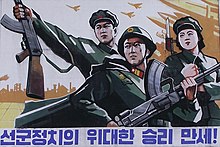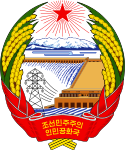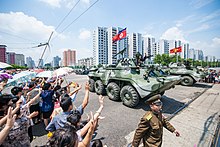
Kim Jong Il was a North Korean politician who was the second supreme leader of North Korea. He led North Korea from the death of his father Kim Il Sung in 1994 until his own death in 2011, when he was succeeded by his son, Kim Jong Un. Afterwards, Kim Jong Il was declared Eternal General Secretary of the WPK.

Juche, officially the Juche idea, is the state ideology of North Korea and the official ideology of the Workers' Party of Korea. North Korean sources attribute its conceptualization to Kim Il Sung, the country's founder and first leader. Juche was originally regarded as a variant of Marxism–Leninism until Kim Jong Il, Kim Il Sung's son and successor, declared it a distinct ideology in the 1970s. Kim Jong Il further developed Juche in the 1980s and 1990s by making ideological breaks from Marxism–Leninism and increasing the importance of his father's ideas.

The Korean Central News Agency (KCNA) is the state news agency of North Korea. The agency portrays the views of the North Korean government for both domestic and foreign consumption. It was established on December 5, 1946, and now features online coverage.
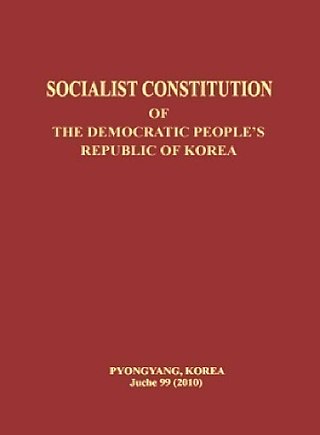
The Socialist Constitution of the Democratic People's Republic of Korea is the constitution of North Korea. It was approved by the 6th Supreme People's Assembly at its first session on 27 December 1972, and has been amended and supplemented in 1998, 2009, 2012, 2013, 2016, 2019 (twice), and in 2023. It replaced the country's first constitution which was approved in 1948.

The Socialist Patriotic Youth League is a North Korean youth organization. It is the main youth organization in North Korea. Directly under the party Central Committee, it is the only mass organization expressly mentioned in the charter of the Workers' Party of Korea. Youth under 15 may join the Young Pioneer Corps, itself a part of the larger Korean Children's Union. The organization, modeled after the Komsomol in the former Soviet Union, includes all North Koreans without party membership between the ages of 15 and 30, although married women who opt to become housewives are transferred to the Socialist Women's Union. Officially, the guiding ideology of the organization is Kimilsungism–Kimjongilism.

The Workers' Party of Korea (WPK) is the sole ruling party of the Democratic People's Republic of Korea, commonly known as North Korea. Founded in 1949 from a merger between the Workers' Party of North Korea and the Workers' Party of South Korea, the WPK is the oldest active party in Korea. It also controls the Korean People's Army, North Korea's armed forces. The WPK is the largest party represented in the Supreme People's Assembly and coexists with two other legal parties that are completely subservient to the WPK and must accept the WPK's "leading role" as a condition of their existence. The WPK is banned in the Republic of Korea under the National Security Act and is sanctioned by the United Nations, the European Union, Australia, and the United States.
The Respected Comrade Supreme Commander Is Our Destiny is a 2008 North Korean film, described by the North Korean State news agency KCNA as a "documentary film".
The award system of the Democratic People's Republic of Korea was initially created less than one month after the foundation of the Republic. During the years of Japanese occupation of Korea, many of the future leaders fled to the Soviet Union. During World War II many if not close to all party leaders and Korean People's Army commanders served in the Soviet Army and as such adopted many of the Soviet awards criteria for their own. During the late 1940s and until the Sino-Soviet Split in late 1958, orders and titles were made in the Soviet Money Mints in Moscow or Leningrad. Soviet made awards were modeled after Soviet orders and made of sterling silver. Initially the orders were attached to clothing with a screw-plate, but after Soviet production stopped, production was moved to North Korea. The screwback was replaced with a pin and the silver content was replaced with cheap tin. With the exception of a few examples of modern orders, Soviet and Czech KPA awards are the most sought after in current militaria markets.
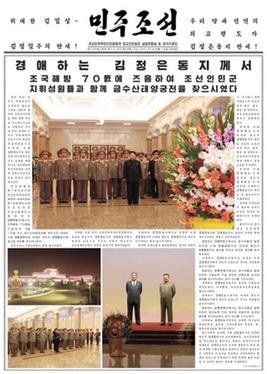
Minju Choson is a state-run North Korean government newspaper. It is published in Pyongyang. It was started in 1945. It is the principal newspaper of the Cabinet of North Korea and the Standing Committee of the Supreme People's Assembly.

The North Korean cult of personality surrounding the Kim family, has existed in North Korea for decades and can be found in many examples of North Korean culture. Although not acknowledged by the North Korean government, many defectors and Western visitors state there are often stiff penalties for those who criticize or do not show "proper" respect for the former leaders of the country, Kim Il Sung and Kim Jong Il, officially referred to as "eternal leaders of Korea". The personality cult began soon after Kim Il Sung took power in 1948, and was greatly expanded after his death in 1994.
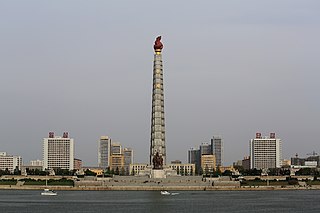
Ten Principles for the Establishment of a Monolithic Ideological System are a set of ten principles and sixty-five clauses establishing standards for governance and guiding the behaviors of the people of North Korea. First published in 1974, the Ten Principles mandate absolute loyalty and obedience to the ideas of Kim Il Sung, and later his successor Kim Jong Il, establishing them as the country's supreme political authorities.

Reminiscences: With the Century is the autobiography of Kim Il Sung, founder and former president of North Korea. The memoirs, written in 1992 and published in eight volumes, retell Kim's life story through his childhood to the time of Korean resistance. Initially, a total of 30 volumes were planned but Kim Il Sung died in 1994 after just six volumes; the seventh and eight volumes were published posthumously. The work reveals early influences of religious and literary ideas on Kim's thinking. An important part of North Korean literature, With the Century is held as a valuable if unreliable insight into the nation's modern history under late colonial Korea. The book is considered one of a few North Korean primary sources widely available in the West and as notable research material for North Korean studies.

On the Juche Idea is a treatise attributed to North Korean leader Kim Jong Il on the North Korean Juche ideology. It is considered the most authoritative work on Juche.

Upon its liberation in 1945 and subsequent foundation in 1948, North Korea adopted national symbols distinct from the national symbols of South Korea. The traditional flag of Korea, the Taegukgi, and the symbol Taeguk, were swapped for socialist symbols.

The Day of the Shining Star is a public holiday in North Korea falling on 16 February, the anniversary of the birth of the country's second leader, Kim Jong Il. Along with the Day of the Sun, the birthday of his father Kim Il Sung, it is the most important public holiday in the country.
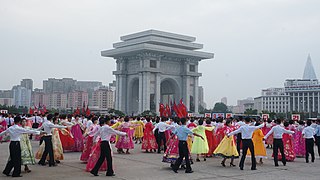
The Day of Songun is a public holiday in North Korea celebrated on 25 August annually to commemorate the beginning of Kim Jong Il's Songun (military-first) leadership in 1960.
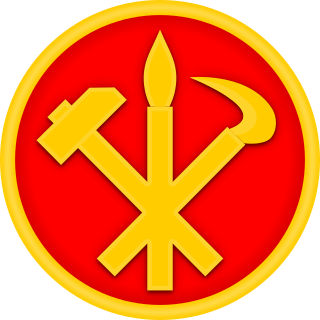
The Propaganda and Agitation Department, officially translated as the Publicity and Information Department, is a department of the Central Committee of the Workers' Party of Korea (WPK) tasked with coordinating the creation and dissemination of propaganda in North Korea. It is the highest propaganda organization in the country.
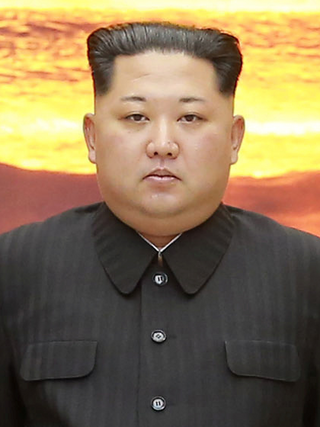
Kim Jong Un has been the supreme leader of North Korea since the death of Kim Jong Il in 2011.

Let Us March Forward Dynamically Towards Final Victory, Holding Higher the Banner of Songun is a speech by Kim Jong Un on 15 April 2012, given to commemorate the centenary of the birth of Kim Il Sung. It was his first major public speech after succeeding his father Kim Jong Il after his death in 2011. He had given at least one speech, Let Us Brilliantly Accomplish the Revolutionary Cause of Juche, Holding Kim Jong Il in High Esteem as the Eternal General Secretary of Our Party, to party officials the week before.

Officially, the Workers' Party of Korea (WPK) – the ruling party of North Korea – is a communist party guided by Kimilsungism–Kimjongilism, a synthesis of the ideas of Kim Il Sung and Kim Jong Il. The party is committed to Juche, an ideology attributed to Kim Il Sung which promotes national independence and development through the efforts of the popular masses. Although Juche was originally presented as the Korean interpretation of Marxism–Leninism, the party now presents it as a freestanding philosophy. The WPK recognizes the ruling Kim family as the ultimate source of its political thought. The fourth party conference, held in 2012, amended the party rules to state that Kimilsungism–Kimjongilism was "the only guiding idea of the party". Under Kim Jong Il, who governed as chairman of the National Defence Commission, communism was steadily removed from party and state documents in favour of Songun, or military-first politics. The military, rather than the working class, was established as the base of political power. However, his successor Kim Jong Un reversed this position in 2021, replacing Songun with "people-first politics" as the party's political method and reasserting the party's commitment to communism.
